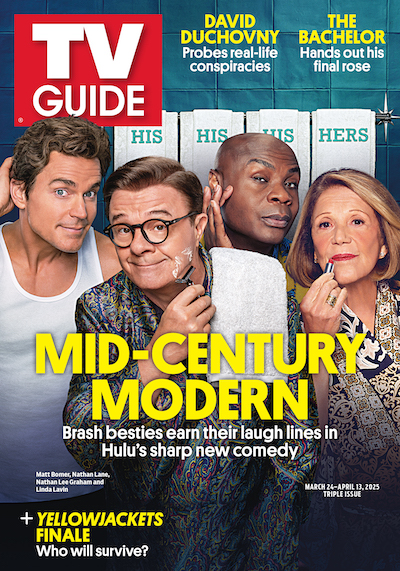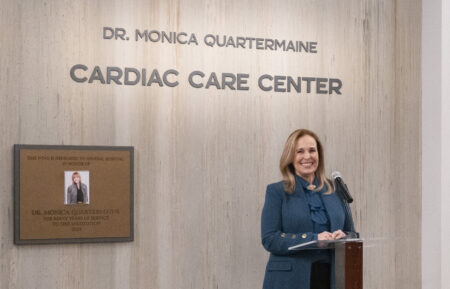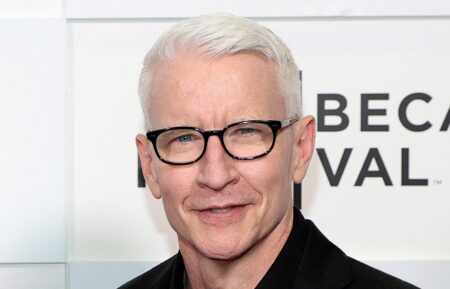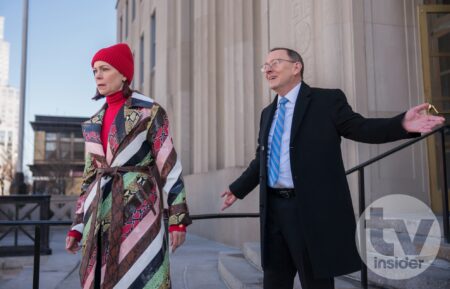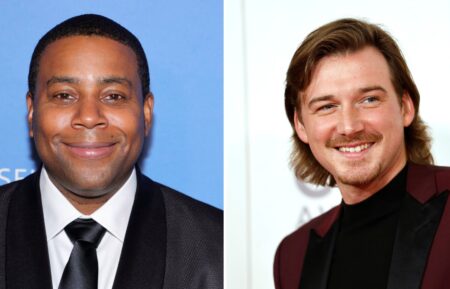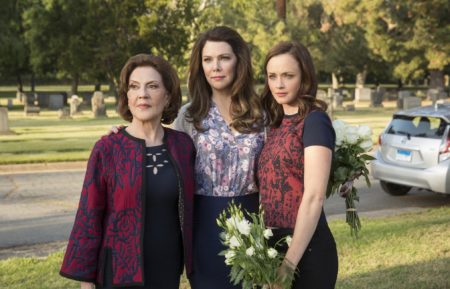‘Dead To Me’: How Creator Liz Feldman Crafted That Emotional Final Season
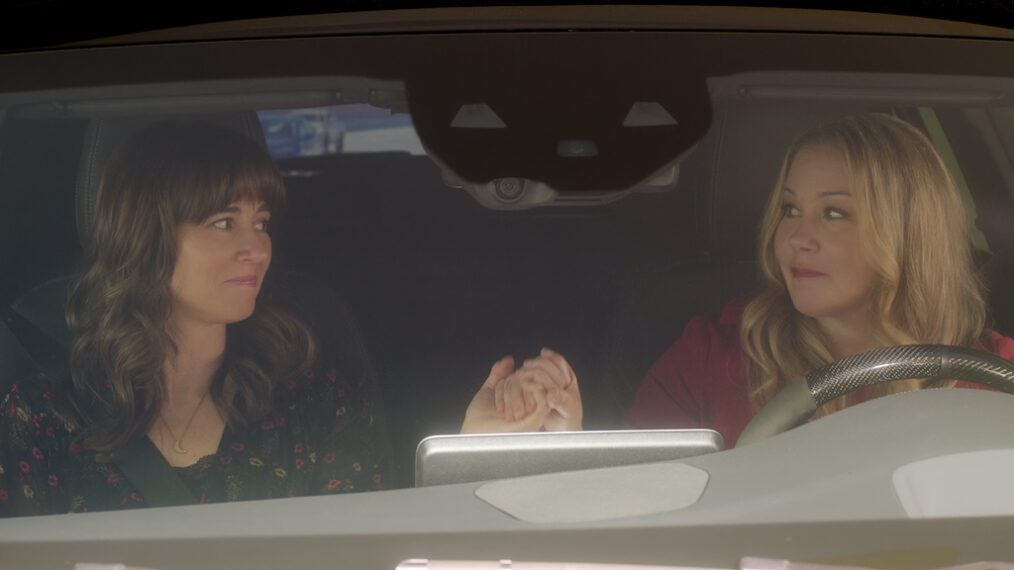
Spoiler Alert
The final glass of wine has been poured and everyone’s darkest secrets have (almost) been revealed — after three seasons, Netflix‘s Dead To Me has reached its official end. The Netflix dramedy, which burst into the scene in 2019 and quickly became beloved thanks to its sharp writing and chemistry between leads Christina Applegate and Linda Cardellini, aired its final season on November 17, finally revealing the ultimate endgame for the trauma-bound BFFs.
So how did the show ride off into the sunset (outlaw names intact, of course)? While the police and the FBI continued to track down clues about Steve Wood (James Marsden)’s murder, Cardellini’s Judy Hale discovered that she was living with stage 4 cervical cancer — and that she was terminal. Meanwhile, Applegate’s Jen Harding discovered she was miraculously pregnant, with the father of the baby was none other than Steve’s twin brother Ben (also James Marsden), who confessed to his hit-and-run and ended up in jail before being sprung loose.
Despite all odds, the two friends managed to evade the law yet again thanks to some luck and the help of Detective Perez (Diana-Maria Riva) and after a much-needed getaway to Mexico, Jen left Judy to live out her final days in peace while she returned to her family to start a new life. Below, series creator Liz Feldman shares how she came to the devastating (but fitting) ending, how strongly the character of Judy was inspired by her real-life friend, and more.
I know you’ve been open about the fact that the ending of the show came to you pretty clearly in the second season. I’m curious how much of that ending, when you thought of it, was fully formed in terms of what we saw in the final episodes.
Liz Feldman: I would say what came to me was the arc of the season — the motif and the arc of the season for our main characters in that I’m looking at the entire timeline of the show and I’m thinking to myself, ‘okay, well, this began as a story about love, loss, grief, and friendship. And if that’s how it began, then what is the most appropriate way to end it?’ And I just started thinking about that — like grief, loss, forgiveness, friendship, these themes that are recurrent in the show and the themes that drove me to want to write the show in the first place. And when I really sort of meditated on the best way to sort of bring all of these characters closure and healing, this is what I came up with. I definitely didn’t come up with all of the story points. That’s why I have a roomful of very talented writers who helped me along the way with all the details. But I just sort of try to capture a feeling in the beginning. And then I write towards that feeling.
Judy is someone who has been through so much in her life, but through it all, she’s remained optimistic and hugely hearted — as Jen says, she’s an actual angel. How did the decision of deciding her fate come about?
I’ll just say that Judy was inspired in part by a dear friend of mine, who was all those things you just mentioned — huge-hearted and joyful and always optimistic and finding the good in people. And, you know, I was one of those people. And she didn’t get to live the life that I wish she could have lived. She left us way too soon. So she was always an inspiration for Judy. She’s actually a style inspiration for her as well, and that’s why Judy dresses the way she does. I didn’t know from the start of the show that this is how I wanted to complete Judy’s story. I just took inspiration from a friend of mine and then when I really looked at my friend’s life, which ended way too soon, I realized, oh wow, that is actually kind of an appropriate way for these two characters to find closure.
Did you ever get any pushback from Netflix when you were crafting the third season, like being told you had to end things on a cliffhanger or that you had to end things a certain way?
To be honest, I had complete creative control and freedom over the way in which I wanted to tell this story. And I always have. I mean, there were maybe some pushbacks early on, when we were figuring out what the show was and before we sort of had proof of concept. But I am so grateful to Netflix and CBS Studios for giving me the space and the trust to bring these characters to a fitting end. Honestly, the only pushback that I got was from myself, because I just kept pushing myself and the writers to come up with an ending that felt satisfying but also that felt like the show. I didn’t want to just give you a happy ending, because we all wish that we could have that in our lives. This show has always been a little bit heightened, but it has always been based in reality, especially as the relationships go and especially as we handle these big themes like death and forgiveness and the good and bad and all people. It was my decision to end it the way that we did, for better or for worse. And I realized, this is a show that always ends on a cliffhanger. So why should the finale be any different?
Honestly, one of the biggest compliments I can give the show is that when I was thinking about where things were going end up, I couldn’t predict anything. I definitely had some ideas of what I hoped to see, but I don’t think I ever sat down and said “I know exactly how this is going to end” because I didn’t! I had no idea how things would end and as a fan, I love that.
Well, thank you. I mean, honestly, that is a great compliment. And, you know, that is the thrill of being a storyteller. And for me, the real gift of this show has been that challenge of coming up with stories and plot points that constantly delight and surprise and that’s always what our goal was. I would say obviously, this season there are some plot twists that don’t delight so much as they heartbreak a little bit. But, you know, that’s the thrill for me. That’s the thrill of doing this show. It’s always trying to come up with things that like you just won’t see coming.
I’m going to get a little specific here — the penultimate episode of every season has historically always been one that’s very intense and brings a lot of things to a head: season one was Judy telling Jen about Ted, and season 2 was Jen telling Judy about Steve. But the penultimate episode for this season was more about the quiet emotional moments instead of the big explosive ones. Has that kind of culmination always been a deliberate choice as you put the story together?
I can’t say that we always look at the season in terms of, ‘okay, episode nine is meant to be big and explosive.’ And it’s more that. Again, I’m always trying to honor these characters and what they’ve been through and always drive them towards action that feels earned based on who we know them to be. And I think by season three, you know these characters so well that perhaps some of the choices they’re making and the action that they’re taking isn’t so surprising anymore. These characters are also really dealing with some pretty heavy realities by episode nine. And I think in part as a way to balance the drama with the black comedy, the mystery, and this sort of thriller of it all, oftentimes our ninth episode feels perhaps more like a finale. And that is something I have done deliberately with the show — sort of play with expectation in terms of where you think the highs and lows should come based on our experience with other TV shows and movies that we’ve digested over the years. So I’m always sort of gauging it on, what do I think would happen here? Well, you know, let’s dig a little bit deeper and see if we can’t come up with something that keeps everybody on their toes.
This series has become beloved by so many fans, many of who are devoted to the characters and the story. What do you hope that they take away from the series and what are your hopes for what they feel after seeing the finale?
I really do want to make the audience look at their own relationship with grief. This might be a little bit lofty, but I think part of what I’m trying to do is bring people through their own stages of grief kind of throughout this entire season. And as a way of sort of showing that grief is just a part of the experience of living and loving people. You know, if you love someone, and you’ve lived long enough, you will have experienced some form of loss. And I think that that’s just a fact of life. And it’s something that I think is really hard to accept. But I’m hoping that perhaps the audience can come to a form of acceptance by the end of this that there is beauty in loss because it’s a reflection of how much we loved.
Dead To Me, streaming now, Netflix
From TV Guide Magazine
How Hulu's 'Mid-Century Modern' Is a 'Golden Girls' for Our Times
Settle in for some older and bolder laughs with the BFFs of a certain age in the new comedy starring Nathan Lane, Matt Bomer, and Nathan Lee Graham. Read the story now on TV Insider.

